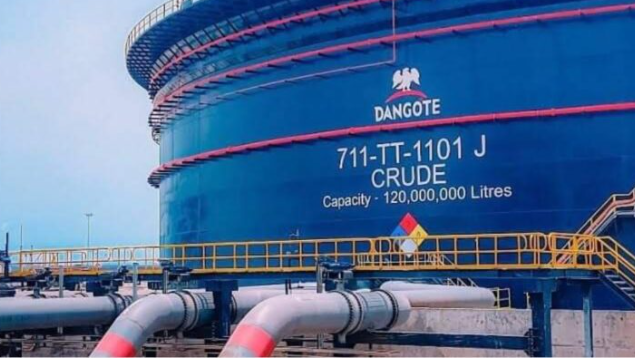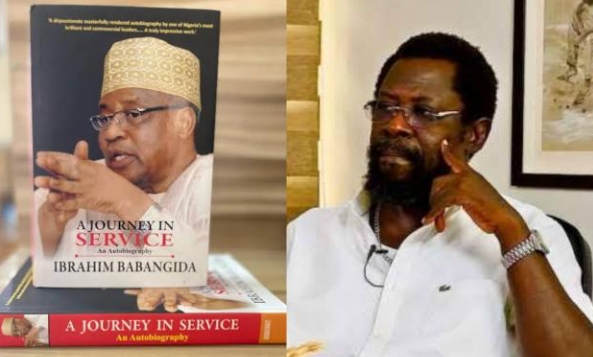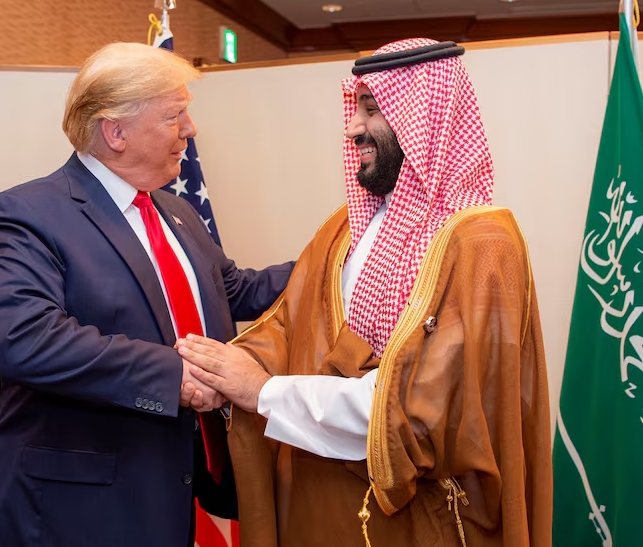News
Dangote to start crude production soon-Report

By Kayode Sanni-Arewa
Amid feedstock challenges, the Dangote Group, owners of the Dangote Refinery, will soon commence crude oil production.
According to reports by S&P Global Commodity Insights, the Dangote Group is looking to start production at its two Nigerian oil assets in the fourth quarter of 2024.
The company, which has endured months of crude supply woes, would reportedly commence production at its two Niger Delta upstream projects in Oil Mining Leases 71 and 72, starting with about 20,000 barrels per day before ramping up further in the first quarter of 2025.
“The company source said production at the company’s two Niger Delta upstream projects in Oil Mining Leases 71 and 72 would start at around 20,000 b/d, before ramping up further in the first quarter of 2025,” the report said.
The report stated that Dangote is currently seeking a floating production, storage and offloading vessel with a capacity of 650,000 barrels of crude.
The company, it was learnt, holds an 85 per cent stake in West African E&P Venture, which in turn has a 45 per cent working interest in the two blocks, alongside the state-owned Nigerian National Petroleum Company’s 55 per cent.
The other stakeholder in West African E&P is Nigerian upstream player, First E&P, which operates OMLs 71 and 72.
“The licences are located in the shallow water in the southeast of the troubled Niger Delta, just 22 km from the onshore Bonny terminal. They contain the Kalaekule and Koronama oilfields.
“Discoveries were first made on the blocks in 1966, and Shell began production there two decades later. Output peaked at 21,000 b/d in 1999, before declining in 2003,” S&P explained.
However, according to Commodity Insights, the fields still hold recoverable resources of almost 300 million barrels of oil and as much as 2.3 trillion cubic feet of natural gas.
The report noted that though Dangote’s upstream activities are seldom discussed, the imminent startup of production at OMLs 71 and 72 suggests the Dangote refinery could soon supplement its crude feedstock, after battling crude supply issues for months.
The $20 billion facility came online in January, and started up its residue catalytic cracker in early September, allowing for high-volume petrol production when the unit stabilises.
Built by Africa’s richest man, the refinery was designed to end Nigeria’s decades-long dependence on imported refined products. To date, it has produced volumes of gasoline, diesel, gasoil, jet fuel and naphtha, for domestic use and export.
However, the plant struggled to obtain sufficient Nigerian crude in its early months, forcing it to import large volumes of WTI Midland crude from the US, and sparking a bitter public row between the NNPC, international oil companies, Dangote and Nigeria’s upstream regulators.
Data from S&P Global Commodities at Sea shows Dangote took just under 200,000 bpd of Nigerian crude in September and it has not imported any US crude since mid-July.
However, Dangote may acquire crude from other oil producers, including Libya, Senegal and even Brazil, with company sources warning that NNPC could only be able to fulfil 60 per cent of its crude demand.
News
Saudi Arabia donates 100 tonnes of dates to Nigeria as fasting approaches

By Kayode Sanni-Arewa
The Embassy of the Kingdom of Saudi Arabia in Abuja has held an official ceremony to distribute 100 tonnes (100,000kg) of dates to Nigeria as part of its annual humanitarian relief efforts.
The initiative, facilitated by the King Salman Humanitarian Aid and Relief Centre (KSrelief), aims to support vulnerable families across the country and strengthen the deep-rooted ties between the two nations.
During the ceremony, the Ambassador of the Custodian of the Two Holy Mosques to Nigeria, Faisal bin Ibrahim, conveyed the Kingdom’s dedication to humanitarian causes.
He expressed his profound gratitude to King Salman bin Abdulaziz and Crown Prince Mohammed bin Salman for their unwavering support in providing aid to Muslims and underserved communities worldwide.
He emphasised that Saudi Arabia remains steadfast in its commitment to fostering Islamic solidarity and providing relief to those in need.
Mr Al-Ghamdi explained that this year’s distribution includes 50 tonnes of dates for Abuja and another 50 tonnes for Kano, continuing Saudi Arabia’s tradition of assisting Nigeria through humanitarian donations.
He noted that the initiative represents the Kingdom’s broader mission to uplift Muslim communities, alleviate suffering, and promote unity, particularly during significant religious periods such as Ramadan.
The embassy, in collaboration with local authorities and humanitarian organisations, will ensure the proper distribution of the dates so that they reach the most vulnerable families in various regions of Nigeria
Saudi Arabia has been a longstanding partner in providing humanitarian aid to nations across the globe, including Nigeria. The Kingdom’s continued efforts in supporting food security and welfare initiatives exemplify its role as a global leader in charitable and humanitarian endeavours.
Through Vision 2030, Saudi Arabia seeks to expand its contributions to international humanitarian causes, reinforcing its dedication to fostering peace, stability, and prosperity worldwide. The ongoing provision of aid to Nigeria is a testament to these commitments and highlights the decades-long partnership between the two brotherly nations.
News
Babangida’s Book is filled with distorted facts, collection of lies, says Dele Farotimi

By Kayode Sanni-Arewa
Dele Farotimi, a human rights lawyer, has launched a heavy attack on former dictator Gen. Ibrahim Babangida (retd.), describing his reign as “ruinous”.
Farotimi, who lived through Babangida’s rule, recounted his experiences as a participant in the fight against the former leader’s “evil actions and inactions
Farotimi’s comments come after Babangida’s recent admission that Chief M.K.O. Abiola won the 1993 presidential election, which Babangida annulled.
The human rights lawyer expressed his disappointment, but not surprise, at the “mixed bag of lies, half-truths, urban legends, and obfuscations” in Babangida’s recent statements.
Farotimi’s criticism is not isolated, as many Nigerians have questioned Babangida’s legacy and the lack of consequences for his actions. The annulment of the 1993 election led to widespread protests and a prolonged struggle for democracy in Nigeria.
In a statement, Farotimi concluded, “No hagiographic allocutus can redeem the Evil Genius of Minna”.
The statement was shared on X while he was reacting to a comment made by Adnan Abdullahi Adam, which stated that “it’s better to read every side of exposition before forming your own judgement”.
With the cover picture of the IBB’s memoir “A Journey In Service” @realadnantweet wrote:
“I think IBB’s memoir: “A Journey in Service” exposes a fresh perspective on everything.
“It’s better to read every side of exposition before forming your own judgement.
“Everyone should try reading the book as jury to the plea of the accused.”
Responding Farotimi wrote: “I lived through his ruinous reign. I wasn’t a passive victim of his evil actions and inactions, I was a participant in the fight to be freed of him.
“I am painfully aware of the extent of his evil capabilities, and I have not been disappointed by the mixed bag of lies, half truths, urban legends, and obfuscations contained in the excerpts already in the public domain. No hagiographic allocutus can redeem the Evil Genius of Minna.”
On Thursday, February 20, 2025, former Nigerian military ruler General Ibrahim Badamasi Babangida (IBB) released his long-anticipated autobiography, “A Journey in Service.”
The memoir has ignited a firestorm of controversy, with critics accusing Babangida of distorting historical events and maligning deceased individuals who cannot defend themselves.
This development has reopened debates about his tenure and its lasting impact on Nigeria’s political and economic landscape.
Babangida’s tenure from 1985 to 1993 was marked by the implementation of the Structural Adjustment Programme (SAP), among others. In “A Journey in Service,” he provides an insider’s perspective on the adoption of SAP, aiming to offer context for the controversial policy that aimed to liberalize Nigeria’s economy.
While intended to address economic challenges, SAP led to widespread protests and debates due to its harsh austerity measures and the social hardships it imposed.
Critics, however, contend that Babangida’s memoir serves as a self-exoneration tool, selectively presenting events to absolve himself of blame.
Human rights lawyer and former Chairman of the Nigerian Human Rights Commission, Prof. Chidi Odinkalu, described the book as a “pack of lies,” accusing Babangida of making allegations against deceased individuals who cannot contest his claims.
Odinkalu further criticized Babangida for portraying himself as a victim of circumstances orchestrated by those who are no longer alive to defend themselves.
The memoir has also rekindled discussions about Babangida’s annulment of the June 12, 1993, presidential election, widely regarded as one of Nigeria’s freest and fairest elections. In the book, Babangida attempts to justify the annulment, a move that plunged the nation into political turmoil and prolonged military rule. Many Nigerians view this action as a significant setback to the country’s democratic progress.
News
Saudi Arabia plans to invest $600bn in new US trade over 4 years

By Kayode Sanni-Arewa
Saudi Arabian Crown Prince Mohammed bin Salman told President Donald Trump that the kingdom wants to put $600 billion into expanded investment and trade with the United States over the next four years, the Saudi State news agency said early on Thursday.
In a phone call between the two leaders, the crown prince said the Trump administration’s expected reforms could create “unprecedented economic prosperity”, the state news agency reported.
The report said Saudi Arabia wants its investments to capitalize on these conditions. It did not detail the source of the $600 billion, whether it would be public or private spending nor how the money would be deployed.
The investment “could increase further if additional opportunities arise”, the agency quoted Bin Salman as telling Trump.
Trump fostered close ties with Gulf states including Saudi Arabia during his first term. The country invested $2 billion in a firm formed by Jared Kushner, Trump’s son-in-law and former aide, after Trump left office.
Trump said following his inauguration on Monday that he would consider making Saudi Arabia his first destination for a foreign visit if Riyadh agreed to buy $500 billion worth of American products, similar to what he did in his first term.
“I did it with Saudi Arabia last time because they agreed to buy $450 billion worth of our product. I said I’ll do it but you have to buy American product, and they agreed to do that,” Trump said, referring to his 2017 visit to the Gulf kingdom.
The Reuters Daily Briefing newsletter provides all the news you need to start your day. Sign up here.
Reporting by Hatem Maher; Editing by Leslie Adler and Cynthia Osterman
-

 Metro18 hours ago
Metro18 hours agoInsecurity! Gunmen invade church, slash pastor’s 2 fingers
-

 Metro18 hours ago
Metro18 hours agoFire engulfs MTN office in Oyo
-

 Foreign18 hours ago
Foreign18 hours agoPentagon set to sack 5400 staff as attack hits Trump’s downsizing plan
-

 Metro18 hours ago
Metro18 hours agoDanger averted as police rescued six kids from collapsed building
-

 Sports19 hours ago
Sports19 hours agoEnd of road for Arsenal, may not win any shield this season – Report
-

 News18 hours ago
News18 hours agoNSCDC, Tantita intensify joint efforts to combat oil theft in Niger Delta
-

 News12 hours ago
News12 hours agoThai lady arrested at Lagos airport with boxes of illicit drug consignments
-

 Politics19 hours ago
Politics19 hours agoEx-Delta Reps member Ossai dumps PDP for APC







